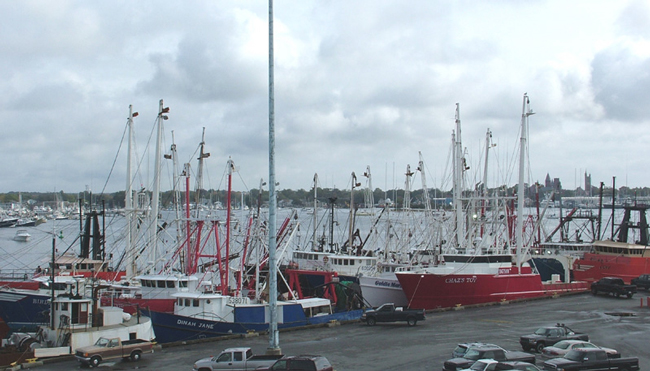PORT MAYOR SAYS GROUNDFISH DIALOGUE DRIVEN BY FEAR continued from Homepage

“There’s dramatic consolidation going on. You can see it in New Bedford, by all the boats tied up and all the ancillary industries. It also affects, literally, everything – car sales, foreclosures, bankruptcies, families staying together, kids, quality of life.” - New Bedford Mayor Scott Lang. In a letter dated Nov. 21, Maine Gov. Paul LePage wrote to U.S. Secretary of Commerce John E. Bryson calling for a federal fisheries disaster declaration for Maine’s groundfishing fleet. Fishermen's Voice Photo
He said that, in his experience, the industry supports the process of working out a viable catch share system that strikes a balance between conservation of the resource and sustainability of the industry. However, he said that, in his experience, the industry’s discussion of the issues is now based on fear.
“The one thing that struck me, that I think is very important, is that much of the talk on the street or on the docks is that we must preserve the catch share or any other system because the fear of the unknown. ‘We must preserve the catch share system because it will get far worse if we don’t.’ And the tone alarms me,” Lang said. “My gut feeling is that this process should be nurturing, from the standpoint of people developing trust….But when I have fishermen say, ‘Don’t scrap the system because we fear it will get worse,’ it misses the entire point.”
Lang said the industry has good reason to be fearful. He said that the reduction of the groundfish fleet, overall, has had “dramatic” impact on the industry and on fishing communities and families.
“It’s having a real effect in port cities,” Lang told.
He cautioned the council against using total revenues to assess the health of the industry. He said the rising price of fish has resulted in overall revenues that are comparable to past years—a situation, he said, that masks the shift of fishing effort from a historically large and diverse fleet to what has become a much smaller fleet today.
“You consolidate the fleet and all the jobs and, by saying that as long as they gross the same, it will all work out—this is microeconomics,” Lang said. “It’s not something where you simply say the gross is met and the industry therefore must be healthy. There’s dramatic consolidation going on. You can see it in New Bedford, by all the boats tied up. You can see it in everything, in the fishing fleet and all the ancillary industries. It also affects, literally, everything—car sales, foreclosures, bankruptcies, families staying together, kids, quality of life. So we have to look at this a little more in-depth when it comes to analysis, and we have to start building some trust here.”
Lang’s remarks came just days before the state of Maine again sought federal relief for Maine’s groundfish industry.
In a letter dated Nov. 21, Gov. Paul LePage wrote to U.S. Secretary of Commerce John E. Bryson calling for a federal fisheries disaster declaration for Maine’s groundfishing fleet.
According to a release from the governor's office on November 29, the request comes on the heels of a recently released report documenting the loss of jobs and revenue to Maine resulting from management changes in the Northeast Multispecies (Groundfish) Fishery.
The release said that between 2009 and 2010, Maine suffered the greatest fleet reduction in the Northeast region, with a decline of 33 percent, from 63 to 42 vessels.
LePage said groundfish landings in Maine have decreased from an overall high of nearly 28 million pounds in 1992, to slightly more than 3 million pounds in 2010, jeopardizing the future of Maine’s most important piece of fisheries infrastructure—the Portland Fish Exchange, which is the state’s only fish auction.
“Unfortunately, the analyses that appear to form the basis of these decisions at the federal level fail to consider the cumulative impacts of multiple amendments and framework adjustments that have eliminated the vast majority of vessels active in Maine's groundfish fishery,” LePage wrote to Bryson.
The request for relief follows a similar one in 2008 that was denied earlier this year. Department of Marine Resources Acting Commissioner Patrick Keliher said in the release his staff is standing by to provide whatever further information is necessary to support Maine’s request.
“When you look at what has happened to the once vibrant Portland Fish Exchange, you know that there has been a fisheries disaster with tremendous consequences,” said Keliher. “Through sheer perseverance, the Exchange has managed to keep afloat under the most difficult of circumstances....This disaster declaration and subsequent financial assistance is needed to maintain the critical service they provide to this industry.”
